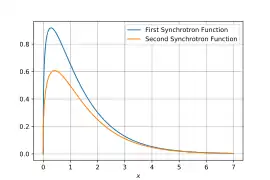
First and second Synchrotron functions.
In mathematics the synchrotron functions are defined as follows (for x ≥ 0):[1]
- First synchrotron function
- Second synchrotron function
where Kj is the modified Bessel function of the second kind.
Use in astrophysics
In astrophysics, x is usually a ratio of frequencies, that is, the frequency over a critical frequency (critical frequency is the frequency at which most synchrotron radiation is radiated). This is needed when calculating the spectra for different types of synchrotron emission. It takes a spectrum of electrons (or any charged particle) generated by a separate process (such as a power law distribution of electrons and positrons from a constant injection spectrum) and converts this to the spectrum of photons generated by the input electrons/positrons.
References
- ↑ Fouka, M.; Ouichaoui, S. (2013-01-29). "Analytical Fits to the Synchrotron Functions". Research in Astronomy and Astrophysics. 13 (6): 680–686. arXiv:1301.6908. Bibcode:2013RAA....13..680F. doi:10.1088/1674-4527/13/6/007. S2CID 118480582.
Further reading
- Longair, Malcolm S. (2011). High energy astrophysics (3rd ed.). Cambridge: Cambridge University Press. ISBN 978-0-511-93059-1. OCLC 702125055.
- Rybicki, George B. (2004). Radiative processes in astrophysics (PDF). Alan P. Lightman. Weinheim. p. 191. ISBN 978-3-527-61817-0. OCLC 212140606.
{{cite book}}: CS1 maint: location missing publisher (link)
This article is issued from Wikipedia. The text is licensed under Creative Commons - Attribution - Sharealike. Additional terms may apply for the media files.